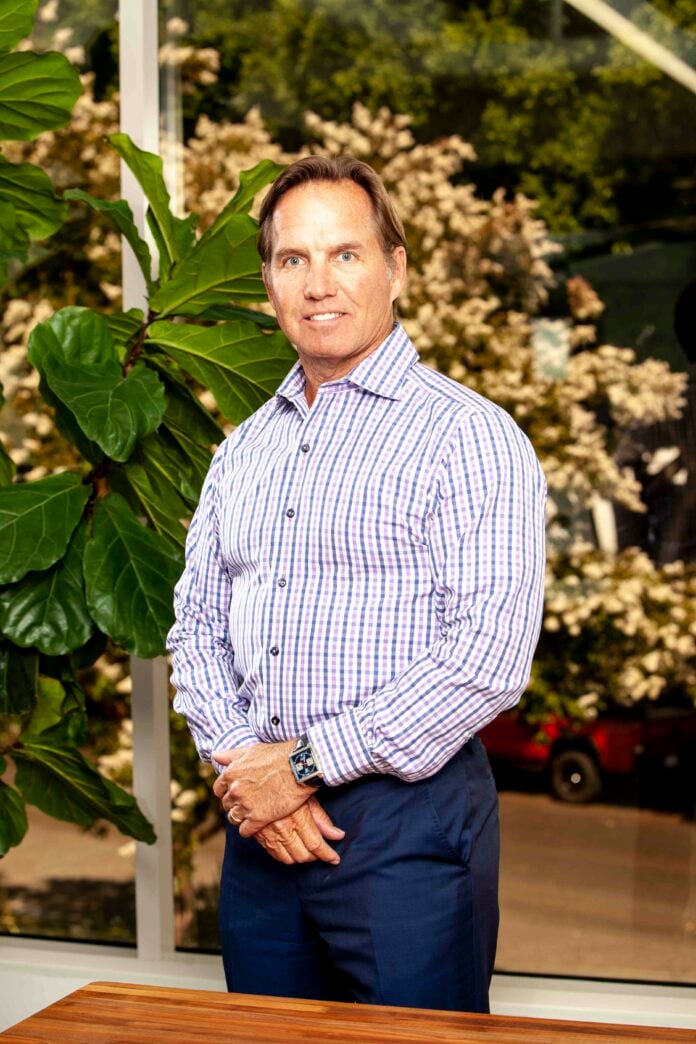Industrial is the hottest commercial real estate asset type now, especially in Southern California with its busy ports and large population. But one of this area’s biggest industrial developers is finding it needs to pull back as the competitive market is making it difficult to find deals.
Instead, the company’s founder plans to put a greater focus on his construction business going forward.
“We’re entering a really difficult time for industrial real estate because of the pricing,” said Chalmers Equity Group’s founder, Trace Chalmers.
Since its formation in 1987, Pico Rivera-based Chalmers Equity has grown dramatically, shedding its initial focus on small apartments to become one of L.A.’s larger industrial developers. It ranked No. 9 on the Business Journal’s list of top developers in L.A. based on projects developed over the past decade.
The company focuses on industrial, something Chalmers had experience in prior to starting his namesake company.
The company works closely with Chalmers’ C.E.G Construction which builds the properties Chalmers Equity Group owns.
The company’s portfolio is 100% industrial real estate assets. It recently sold an office property in the Arts District. Said Chalmers: “We’re not really good office landlords.”
Industrial, he said, is a more straightforward asset type to own.
Bret Hardy, executive managing director at brokerage Newmark Group Inc., said industrial real estate is of huge interest to developers.
“Industrial continues to be the darling of the commercial investment real estate investment world since the onset of the pandemic,” Hardy said. “Industrial was in favor pre-pandemic and is more in favor now. That’s due to ecommerce, third-party logistics, manufacturing and just overall warehouse demand.”
Brianna Demus, vice president at Jones Lang LaSalle Inc., added that sub 1% vacancy rates for industrial space in most of Los Angeles makes it a desirable area. But a lack of land is making it increasingly difficult to develop.
Getting started
When Chalmers founded the company in 1987, it focused on smaller apartment buildings in East Los Angeles and Compton.
He started industrial work as a contractor after the recession in 1989 and went on to become known for industrial work.
Today, the company is focused on industrial projects in areas such as Santa Fe Springs, City of Industry, Commerce and Vernon with projects averaging 75,000 square feet. It focuses on multi-tenant buildings. “We like the fact that if one tenant goes broke, you don’t have a whole building empty,” Chalmers said.
C.E.G Construction, meanwhile, took on its first project in 1993 – a bathroom remodel for Dallas-based Trammell Crow Co.
Initially, a lot of the work was tenant improvement projects brokers helped him find.
“We were still doing whatever development work we could do but most of it shifted to C.E.G Construction,” Chalmers said of the business.
The revenue from the construction business was used to buy industrial properties, which the construction company in turn worked on.
“The key to our company is that we do everything,” Chalmers said. “The construction company has its own engineering, its own architecture, we do our own concrete (work), we’re basically a design-build company and we can do that for Chalmers Equity Group or for the clients.”
Slow times
Chalmers said some of his company’s success came from understanding when to slow down.
“We were doing well and in 2006, 2007, fortunately for us we saw that (recession) coming and took our hands out of the cookie drawer and let other people buy those (projects),” he said. “Thank God we did. Seventy percent of the guys doing what I was doing got wiped out.”
By 2009, Chalmers said his company was “almost the only developer in L.A. County” focused on industrial real estate.
Today’s industrial market has helped the company do well, he said.
“It has been a double whammy for us to get lower interest rates and increased rents.”
But Chalmers said like in the mid-2000s, he is not aggressively acquiring product now.
“We’re sitting here now with a significant amount of capital and although we are still making offers and trying to buy some things, we’re happy to sit on the sideline for a bit,” he said.
Chalmers explained that is difficult to buy land to develop new product.
“Land is crazy expensive,” Chalmers said. “We’re going to have to hold tight for a little bit.”
Chalmers said the company does not have any financial partners and has been “making really good profit models and it didn’t make sense to bring in anyone else.” Instead, he is focusing on the construction business while Chalmers Equity will focus on managing its assets.
David Wirgler, associate director of Stan Johnson Co., said he doesn’t expect a slowdown of developers trying to create industrial product because of the demand in the marketplace, but experts agree it’s expensive and land is scarce.
“There are a lot of challenges for new development. The first is you need available land and we’ve got fewer and fewer available sites in markets where people want to be,” CBRE Group Inc. Vice Chairman Craig Peters said. “Then you’ve got to be able to entitle that land which can take many years … There aren’t many flat sites left so a lot of land has challenges.”
Demus at JLL agreed that there was a lack of land to develop. Looking forward, she sees more developers tearing down existing product to create new buildings.

